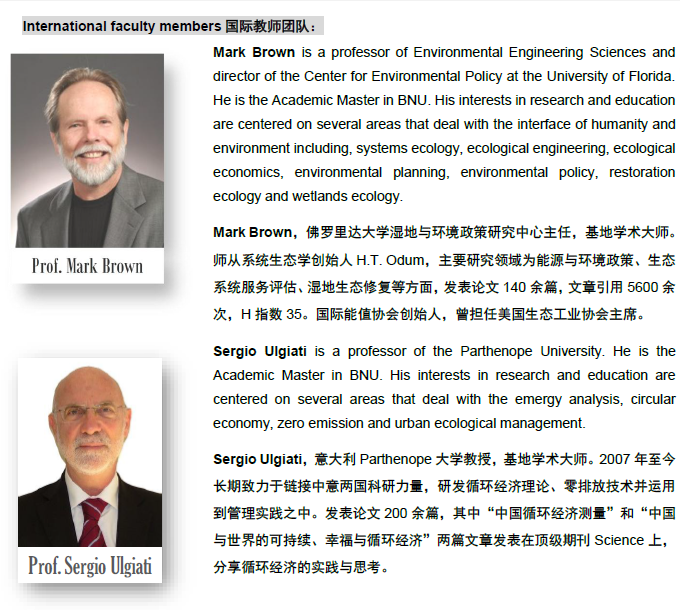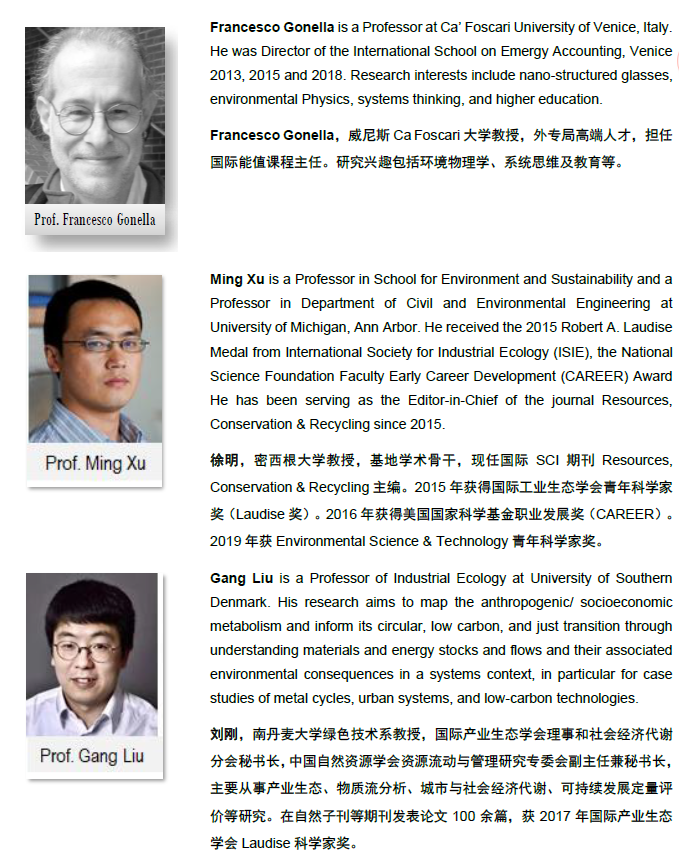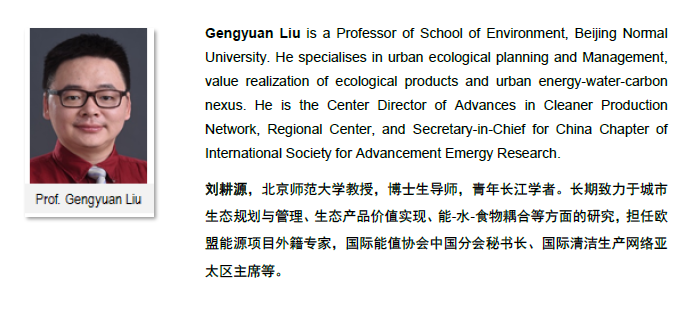
 位置: 首页»
通知公告
位置: 首页»
通知公告
2021 International Summer Workshop:
Training Course on Environmental Ecological System Engineering
2021暑期工作坊:环境生态系统工程国际课程与培训
July 5-9, 2021
Online Course via Zoom/VOOV + Offline Course
School of Environment, Beijing Normal University, Beijing, China
International faculty members国际教师团队:
课程安排 Course Plan:
The course will be arranged as MOOC + Offline course + Online Course
Monday July 5 |
Tuesday July 6 |
Wednesday July 7 |
Thursday July 8 |
Friday July 9 |
|
9:00-14:00 |
Watch MOOC |
Watch MOOC |
Watch MOOC |
Watch MOOC |
Watch MOOC |
14:00-16:30 |
Special Topic Course 1 Gengyuan Liu |
Special Topic Course 2 Gang Liu |
Special Topic Course 3 Gang Liu |
Special Topic Course 4 Ming Xu |
Special Topic Course 5 Ming Xu |
17:30-19:00 |
Online Course A Sergio Ulgiati |
Online Course C Sergio Ulgiati |
Online Course E Sergio Ulgiati |
Online Course G Francesco Gonella |
Online Course I Francesco Gonella |
19:00-20:30 |
Online Course B Mark Brown |
Online Course D Mark Brown |
Online Course F Mark Brown |
Online Course H Mark Brown |
Online Course J Mark/Sergio Issuing of course certificates |
Note: 1. Students will watch the online MOOC course in the morning and learn the basic knowledge of Environmental Accounting and Management.
2. Online course will be divided into two classes due to the time difference. 17:30-19:00 in China Time Zone will be 11:30-13:00 in Roma Time Zone. 19:00-20:30 in China Time Zone will be 7:00-8:30 in NY Time Zone.
3. The course will issue the course certificate after finishing. The certificate is authorized by the International Society of Advancement Emergy Research, etc. All the participates will be invited as the member of ISAER to join the following academic activities.
4. All the BNU students will win 2 credits after the course. Please send your personal information and student ID to Prof. Gengyuan Liu (liugengyuan@bnu.edu.cn)
在线课程信息Online Course Information
Online Course A (by Prof. Sergio Ulgiati):
quick definition of “value”: money, energy, emergy, just as a start (15 minutes maximum)
practical examples of emergy evaluations to understand values and support choices (e.g. trade, agriculture, energy, recycling, water);
Online Course B (by Prof. Mark Brown):
Discussion of systems thinking, Why think systemically? Drawing diagrams.
Discussion of emergy principles and concepts and how they relate to everyday life. Examples of laws of thermodynamics, maximum power, hierarchy, Maximum Power Principle
Calculation of renewable emergy sources from the Geosphere Emergy Baseline
Online Course C (by Prof. Sergio Ulgiati):
quick description of LCA and its use for calculation of UEVs. Examples: UEVs of chemicals used in agriculture.
paper making and recycling. Integrated use of LCA and Emergy for high quality paper making and assessment.
Emergy for Circular Economy policy–making
urban waste management and wastewater, and waste management policies
Online Course D (by Prof. Mark Brown):
Discussion of Emergy Algebra, Issue of double counting. Static and dynamic emergy accounting.
Example emergy accounting table: Static accounting
Example of dynamic accounting: EXCEL solver
Online Course E (by Prof. Sergio Ulgiati):
transportation patterns (cars, buses, trains and high speed trains, flights) and mobility policies
electricity generation from different sources
Emergy assessment of rural and urban environment
Emergy evaluation of electronic waste recovery: costs and benefits
Online Course F (by Prof. Mark Brown):
Discussion of the relations between emergy, economy, and money
Using the NEAD
Discussion of the relations between emergy and urban systems
Online Course G (by Prof. Francesco Gonella)
Emergy accounting of a bioelectricity production site.
Agriculture-breeding-conversion: the role of subsystems in the emergy systemic description.
Online Course H (by Prof. Mark Brown):
Discussion of the concept of “ecosystem”… the difference between natural capital and ecosystem services. Why is limiting factors principle so important? Species and information
Computing and graphing emergy signature of estuarine system
Emergy evaluation of estuarine impacts and losses
Online Course I (by Prof. Francesco Gonella):
Sustainability assessment of bioelectricity production through emergy indicators.
How different scales and boundaries address different narratives for the system sustainability.
Online Course J (by Prof. Mark Brown):
Discussion of concept of environmental impact…assessing environmental impacts
Discussion of emergy evaluation of alternatives. Computing Net Emergy
Simulation modelling: examples using EXCEL
特别邀请课程信息Special Topic Course Information
Special Topic Course 1 (by Prof. Gengyuan Liu)
Special Topic Course 2 (by Prof. Gang Liu)
On economy-wide material flow analysis
√ Basic concepts and methodology introduction
√ Applications and exercise
Special Topic Course 3 (by Prof. Gang Liu)
On substance flow analysis and dynamic material flow analysis
√ Indicator element and substance flow analysis
√ Introduction to STAN software
√ Dynamic material flow analysis: Basic introduction and examples of uses
Special Topic Course 4 (by Prof. Ming Xu)
Introduce the concept of environmental footprints, followed by national accounting systems to develop the basic input-output (IO) analysis framework.
Special Topic Course 5 (by Prof. Ming Xu)
IO techniques to measure various types of environmental footprints of consumption at the sector, national, and international scales.
MOOC课程信息MOOC course information:
https://www.xuetangx.com/course/BNU08251001095/1104919?channel=search_result
详细信息见附件(附件)
课程注册信息Registration Information:
If you are interested, please send your person information to Prof. Gengyuan Liu’s email address (liugengyuan@bnu.edu.cn).
The course will be free for BNU students. Students from other Universities/institutes need to be paid (500 RMB for 5 days course). Payment information will be sent by email.
课程支持单位Supporting Information:
School of Environment, Beijing Normal University
Multi-scale Ecological Simulation and Environmental Security Regulation Technological Innovation Base
State Key Joint Laboratory of Environment Simulation and Pollution Control
Beijing Engineering Research Center for Watershed Environmental Restoration & Integrated Ecological Regulation
International Society for Advancement Emergy Research
附件下载:



